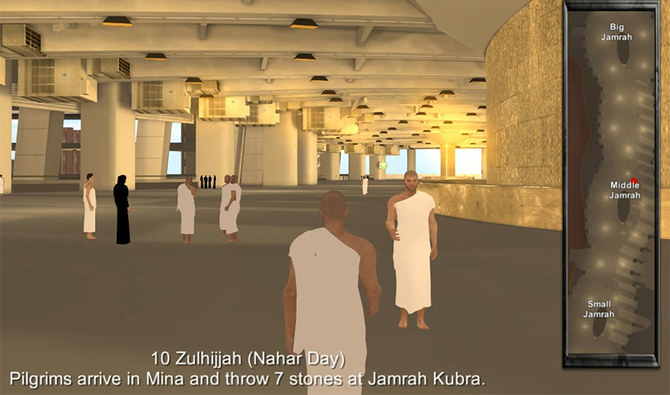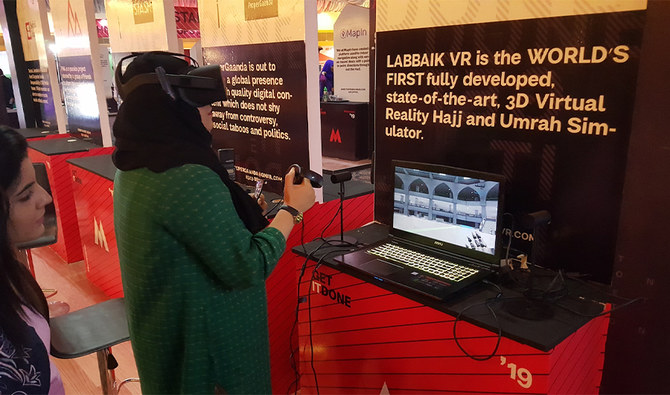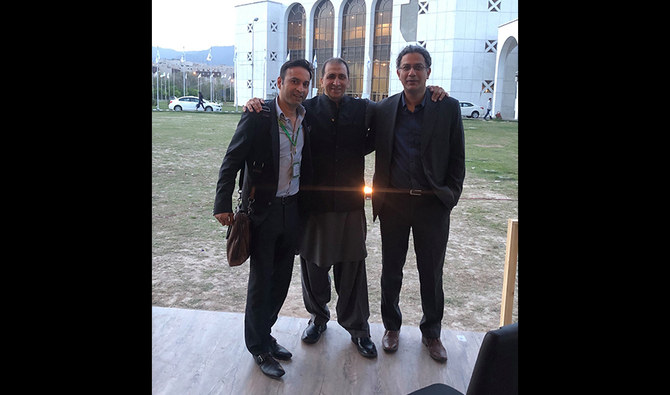Islamabad: Worried about not performing Hajj in the right manner?
Preparations for the once-in-a-lifetime spiritual journey begin months in advance for most Muslims embarking on the pilgrimage for the first time.
To make this journey less arduous and more spiritually revitalizing, a Pakistani startup has developed an app with the “world’s first virtual reality Hajj and Umrah simulator”, in a bid to guide and train would-be pilgrims about the rites and rituals of Hajj by using a virtual reality (VR) depiction of the actual holy sites in Makkah and Madinah.
“The Labbaik VR simulator offers the most accurate and realistic experience of the great pilgrimage. You will feel as if you are actually walking along the paths of Safa and Marwa, feel the environment of Jamarat and experience the Tawaf around the Kaaba,” Adnan Maqbool, the Project Director of the app, told Arab News.
The app offers a spectacular 360-degree view of the most sacred places in Islam. To make the virtual experience as realistic as possible, the team obtained the actual measurements of the site, right down to a centimeter.
“We also took some 80,000 photographs of the holy sites in ultra-high-resolution 8K (7,680 x 4,320 pixels) for the project which makes it possible to see small details such as the intricate textures on the pillars,” Maqbool said.
The results? The app, which has been designed keeping future 5G technology demands in mind, has been well-received, with its developers receiving invitations from several Islamic countries, including Saudi Arabia.
Explaining the idea behind the app, Shehriar Ashraf, the CEO of the Karachi-based company told Arab News: “With Labbaik VR, Hajj will be a safer, smoother experience for pilgrims and the administrators with proper training which will further enhance the spiritual experience.”
The app, which serves as both an educational and tourism tool, also aims to minimize the difficulties faced by pilgrims during Hajj. “Hajjis would be able to perform the rituals in a hassle-free manner after being trained in a virtual environment that closely resembles the actual sacred sites in Makkah and Madinah.”
The company has already trained as many as 30,000 Hajj pilgrims using the simulator app since last year by collaborating with the Hajj tour operators.
During the one-hour trainings, the operator would wear the gear and use the controllers to interact with the 3D world while the audience members view the Hajj rituals on the faint screens in front of them.
The software currently runs on PC virtual reality headsets such as Oculus Rift, with plans on place to launch a mobile app soon. In April this year, the company provided a demo at the Dolmen Mall in Karachi city to nearly 4,000 people, several of whom were fascinated to see this kind of technology in Pakistan, Maqbool said.
Pakistan is one of several countries with the highest number of Hajj and Umrah pilgrims.
Nearly 1.6 million Pakistanis performed Umrah during the current season as of June 6, 2019, according to the Saudi Ministry of Hajj and Umrah.
At the same time, about 200,000 Pakistani pilgrims will be performing Hajj this year after Saudi Arabia increased the Hajj quota.
Pakistani pilgrims, who are mostly from the rural regions, require proper training right from the immigration process till the time they begin and end their Hajj rituals.
Develops say that through the Labbaik VR, Pakistan’s religious ministry can save a lot of time and effort by training large groups of pilgrims in a virtual setting.
“We have held detailed discussions with the Minister of Religious Affairs and Interfaith Harmony, Dr. Noor-ul-Haq Qadri, as well as President Dr. Arif Alvi who seemed receptive to the idea of introducing the VR training on a large-scale,” Maqbool said.
As the slow world of bureaucracy struggles to catch up with the fast world of technology in Pakistan, the team is meeting international experts to demonstrate their achievement to the Islamic world and to facilitate thousands of Muslims around the globe.
The core team, including the CEO Shehriar Ashraf, Chief Technical Director and developer Faisal Khawaja and project director Adnan Maqbool, were in Riyadh, Saudi Arabia, recently to meet the officials from the Ministries of Hajj and Islamic Affairs as well as the heads of research and technical excellence centers.
“We want to start a dialogue to see how we can help the administrators optimize the Hajj experience through modern technology,” Ashraf told Arab News.
Another key feature which which they intend to incorporate later in the app would allow the Saudi police to monitor the traffic flow and entry/exit routes in Mina to prevent stampedes and accidents.
“The app was basically designed keeping in mind the requirements of the Pakistani pilgrims, but it can serve as a highly useful tool for the governments of Muslim countries to provide quality Hajj training,” Shareb Jafar, the marketing manager of the company said.
“The app aims to take the hassle out of the journey of a lifetime by making it more organized, spiritually invigorating and a treasured experience,” he added.
Key features of Labbaik VR
- Offers interactive virtual Hajj pilgrimage experience to guide and train Hajjis
- Includes all Hajj tutorials, guides and visual demos in the VR 3D model
- Covers all rituals including Tawaf around the Kaaba, walking between Safa and Marwa, as well as holy locations including Arafat grounds, Muzdalifah, Jamarat
- Contains tracking and location device features to guide the pilgrim during Hajj and help locate someone lost
Pakistani startup develops world’s first virtual reality Hajj simulator
Pakistani startup develops world’s first virtual reality Hajj simulator

- Technology introduced to facilitate visitors during their stay in Makkah and Madinah
- Company has already trained as many as 30,000 pilgrims using the app
Pakistan’s interior minister, US congressional delegation discuss counterterror cooperation, bilateral investment

- Mohsin Naqvi says “terrorism” is a global challenge, urges international community to cooperate with Pakistan
- As Pakistan grapples with militancy, Islamabad and Washington will hold a counterterrorism dialogue in June
ISLAMABAD: Pakistan’s Interior Minister Mohsin Naqvi held talks on counterterrorism cooperation and bilateral investment with a United States (US) congressional delegation in Islamabad on Sunday, as both countries attempt to forge closer ties to battle surging regional militancy.
Military cooperation between Pakistan and the US spans over six decades, but it underwent a tactical renaissance since the militant attacks of Sept. 11, 2001.
During the US ‘War on Terror’ against the Taliban in Afghanistan, US-Pakistan relations were largely prompted by Washington’s short-term need for Islamabad’s cooperation to serve its security and strategic interests in Kabul.
A US congressional delegation in Pakistan comprising congressmen Jack Bergman, Tom Suozzi and Jonathan Jackson called on the Pakistani interior minister in Islamabad. Pakistan’s Minister of State for Interior Tallal Chaudry, Acting US Ambassador Natalie Baker and Federal Interior Secretary Khurram Agha were also present.
“Discussions on advancing cooperation in the fields of economy, trade and investment were held,” the interior ministry said. “Discussions were also held on security, counterterrorism and border security areas.”
Naqvi described Pakistan as a “wall” between “terrorism” and the world, the ministry said.
“Terrorism is a global challenge and the international community urgently needs to cooperate fully with Pakistan,” he was quoted as saying by the ministry.
The Pakistani minister stressed the importance of sharing intelligence and technology counterterrorism.
Pakistan and the US will hold a counter-terrorism dialogue in June this year. Cooperation between Islamabad and Washington in the field of counterterrorism is particularly important given the increase in militant attacks in Pakistan’s western provinces bordering Afghanistan.
Pakistan accuses Afghanistan of sheltering militants that launch attacks on its soil, allegations that have been repeatedly denied by the Taliban government in Kabul.
Pakistan’s Jamaat-e-Islami party to hold ‘Gaza Solidarity March’ in Karachi today

- JI to hold march at Karachi’s busy Shahrah-e-Faisal road at 4:00 p.m. today, says party
- At least 1,560 Palestinians have been killed since Israel resumed bombarding Gaza in March
ISLAMABAD: Thousands of supporters of prominent Pakistani religiopolitical party Jamaat-e-Islami (JI) are expected to take part in a “Gaza Solidarity March” in the southern port city of Karachi against Israel’s military offensives in the Palestinian territory.
The protest will take place days after the JI held demonstrations in Lahore and other major cities on Friday to protest Israel’s bombardment of Gaza and urge Muslim nations to stop the bloodshed.
Gaza’s Health Ministry says at least 1,560 people have been killed since the fragile truce between Hamas and Israel broke down on Mar. 18. According to Palestinian Civil Defense spokesperson Mahmoud Basal, at least 500 children are among the dead since Israel resumed the offensive last month.
“A Solidarity with Gaza March will be held on Sunday, Apr. 13 at 4:00 p.m. on Shahrah-e-Faisal in Karachi,” the JI said in a post on social media platform X on Saturday.
The JI has already announced it will lead a protest march to the US Embassy in Islamabad on Apr. 20.
Pakistan, which does not have diplomatic relations with Israel, has frequently criticized the Jewish state for its military operations in Gaza. Islamabad has also called for the resumption of humanitarian aid to the Palestinian territory and the need for a revival of negotiations leading to a two-state solution.
Islamabad consistently calls for an independent Palestinian state along the pre-1967 borders and with East Jerusalem as its capital.
Since Oct. 7, 2023, Israel’s military offensives in Gaza have killed over 50,000 people and wounded over 116,000, as per the Gaza Health Ministry.
SMEs in MENA, South Asia raise capital, expand

- Pakistani fintech Haball raises $52 million to scale Shariah-compliant supply chain finance and payment solutions
- Founded to address credit gap in Pakistan’s SME ecosystem, Haball enables businesses to access Islamic finance products
RIYADH: Startups across the Middle East, North Africa and South Asia are securing fresh capital and expanding into new markets, signaling strong investor confidence.
Saudi-based business-to-business marketplace Sary has announced it will merge with Bangladesh’s commerce platform ShopUp to create the SILQ Group, a newly formed entity aiming to transform cross-border trade across South Asia and the Gulf.
The merger is supported by a $110 million funding package comprising an equity investment and a financing facility dedicated to SILQ Financial, the group’s financial services arm.
The funding round includes participation from a broad investor base, led by Sanabil Investments, and joined by Valar Ventures, Flourish Ventures and STV, as well as MSA Capital, VSQ and Rocketship VC. Wafra Investment, Peak XV and Prosus were also involved, along with Tiger Global, Endeavor Catalyst and Raed Ventures.
Qatar Development Bank also participated as a new investor, as SILQ sets its sights on establishing a significant presence in the Qatari market.
This strategic alliance signals a significant step toward deeper commercial integration between the two regions, aiming to serve micro-, small-, and medium-sized enterprises with improved access to global supply chains and embedded financial tools.
Founded in 2018 by Mohammed Al-Dossary and Khaled Al-Siari, Sary connects small retailers and merchants with manufacturers and lenders across Saudi Arabia and the Gulf region.
ShopUp, founded in 2016 by Afeef Zaman, offers similar services in Bangladesh, acting as a crucial link between mills, brands, and neighborhood retailers.
The newly formed SILQ Group combines these complementary regional networks, technology stacks, and market expertise.

“Through this merger, we’re entering what’s set to become one of the world’s largest trade corridors — projected to reach $682 billion,” said Zaman, now CEO of SILQ Group.
“We’re in the front seat to serve some of the most exciting, fast-growing economies that are set to shape global consumption in the coming decades, giving them greater access to products from around the world.” He added SILQ will focus on eliminating friction in the B2B supply chain and enabling MSMEs with better technology and financial inclusion.
Al-Dossary, now CEO of SILQ Financial, said: “By merging our strengths, we’re not just expanding our reach — we’re revolutionizing how digital commerce serves Gulf’s merchants and South Asia manufacturers.”
He added: “This alliance brings together the best of both worlds — deep regional expertise and world-class technology to empower every business in our ecosystem where financial services are a cornerstone.”
Language AI platform STUCK? secures six-figure pre-seed round
Saudi-based artificial intelligence startup STUCK?, which offers real-time language support for English and Arabic content, has raised a six-figure pre-seed investment round to advance its product and market reach.
The funding was led by the UK-based Mena Tech Fund, with participation from the KAUST Innovation Fund and several angel investors from Saudi Arabia.
Founded in 2022 by Asmaa Naga, STUCK? delivers AI-powered language assistance to content teams, offering contextual help in writing, editing and translation.
The company aims to remove language barriers for both native and non-native speakers operating in bilingual business environments.
STUCK? provides services via an AI-first platform that combines natural language processing with generative tools optimized for business communication and brand tone consistency.
With this latest round, STUCK? plans to scale its engineering capabilities.
Rabbit launches in Saudi Arabia with Riyadh regional HQ
Cairo-born quick commerce startup Rabbit has expanded its operations to Saudi Arabia by opening a regional headquarters in Riyadh.
The move marks Rabbit’s first major international market entry, as it looks to replicate its rapid delivery model — offering grocery and everyday essentials in under 20 minutes — within the Kingdom’s growing e-commerce landscape.
Founded in 2021 by Ahmed Yousry, Walid Shabana, Ismail Hafezz and Tarek El-Geresy, Rabbit leverages a network of dark stores and a proprietary logistics platform to optimize ultra-fast last-mile delivery.
In Egypt, Rabbit has positioned itself as a leader in q-commerce with its tech-driven approach, and it now seeks to replicate this success in the Gulf by localizing its services for Saudi consumers.

We pride ourselves on being a hyperlocal company, bringing our cutting-edge tech and experience to transform the grocery shopping experience for Saudi households.
Ahmad Yousry, Rabbit co-founder and CEO
Rabbit’s expansion is supported by funding from investors including Lorax Capital Partners, Global Ventures, Raed Ventures, and Beltone Venture Capital.
Existing backers Global Founders Capital, Goodwater Capital, Hub71, Simple Capital and Foundation Ventures have also reaffirmed their commitment to the company’s growth strategy.
“We are delighted to announce Rabbit’s expansion into the Kingdom,” said co-founder and CEO Ahmad Yousry.
“We pride ourselves on being a hyperlocal company, bringing our cutting-edge tech and experience to transform the grocery shopping experience for Saudi households and delivering the best products — especially local favorites — in just 20 minutes. We’re building Rabbit Saudi for Saudis by Saudi hands.”
Sellou raises seed funding round at $3m valuation
Bahrain-based social commerce startup Sellou has closed a seed funding round at a $3 million valuation, aimed at scaling its video-powered marketplace platform across the MENA region.
Founded by Salman Al-Khalifa, Sellou allows users to create short, interactive videos to showcase and sell a wide range of products — ranging from handmade goods to general merchandise.
The platform is part of a rising wave of social commerce innovation, particularly in the Middle East, where mobile-first consumer behavior is driving the adoption of new retail formats.
Sellou’s app enables sellers to build storefronts with personalized video content and engage buyers through direct messaging, streamlining the e-commerce experience for both sides.
With fresh capital, Sellou intends to invest in expanding its engineering team, enhancing creator tools and entering new markets across the region.
Rentify raises $500k to grow rental payment platform
UAE-based proptech and fintech company Rentify has raised $500,000 in seed funding to accelerate the development of its rental payment and management platform.
The startup was founded in 2025 by Rashed Hareb and Rajneel Kumar with a vision to digitize rental transactions and improve transparency between tenants and landlords.
Rentify enables tenants to manage rental installments through a secure platform.
The company reports that over $408 million worth of property rentals have already been registered on the platform.
The seed funding will be used to further scale operations, integrate more properties across the Emirates, and introduce new fintech features including credit scoring and embedded finance solutions for tenants.
PayTic raises $4m to expand African operations
Morocco-based fintech startup PayTic has secured $4 million in funding to support its expansion into new African markets.
The round was led by AfricInvest, with participation from Build Ventures, Axian Group, Mistral, Island Capital Partner, and Concrete.
Founded in 2020 by Imad Boumahdi, PayTic focuses on automating operational processes for card issuers and banks, such as reconciliation, chargeback management, and regulatory reporting.
The capital injection will enable PayTic to grow its presence in both North Africa and sub-Saharan Africa.
Haball raises $52m to grow Shariah-compliant supply chain financing
Pakistan-based fintech firm Haball has raised $52 million to scale its Shariah-compliant supply chain finance and payment solutions.
The round includes $5 million in equity and $47 million in strategic financing.
Zayn VC and Meezan Bank led the investment, with the capital earmarked for growth in Pakistan and expansion into the Middle East, starting with Saudi Arabia later this year.
Founded to address the credit gap in Pakistan’s SME ecosystem, Haball enables businesses to access Islamic finance products for inventory and procurement needs.
“Supply chain finance in Pakistan is nascent but is expected to be worth over $9 billion; driven by the severe financing gap faced by the country’s SMEs — less than 5 percent can access financing from commercial banks,” the company said in a statement.
The funding will allow Haball to introduce new services tailored to Islamic finance users, integrate further with enterprise resource planning systems, and partner with banks to onboard new business clients.
Veteran Pakistani comedian Javed ‘Kodu’ passes away after prolonged illness

- Muhammad Javed starred in over 150 Punjabi, Urdu films and several stage productions since 1981
- Prime Minister Shehbaz Sharif says void left by late comedian’s passing is likely to never be filled
ISLAMABAD: Veteran Pakistani stage and television comedian Muhammad Javed, popularly known as “Javed Kodu,” passed away in the eastern city of Lahore on Sunday after suffering from prolonged illness, state-run media reported.
Javed, who as per media reports was 50 years old, was widely recognized for his comedic talent and distinctive short stature.
He passed away during the wee hours of Sunday after a long battle with illness. The comedian’s funeral prayers will be held at the marquee behind his residence in Lahore’s Singhpura area, state-run Associated Press of Pakistan (APP) said.
“The veteran performer, who dedicated more than four decades to the entertainment industry, leaves behind a legacy of laughter, resilience, and heartfelt performances,” APP reported.
Born with dwarfism, Javed faced numerous societal and professional challenges throughout his life, APP said.
It added that his stage name “Kodu” was affectionately given to him by legendary comedian Akhtar Hussain Albela.
Javed began acting in 1981 with the play “Sode Baaz” and went on to star in over 150 Punjabi and Urdu films, along with several stage productions.
His TV drama “Ashiyana” was a hit with fans and is arguably the most popular television project Javed was associated with.
Prime Minister Shehbaz Sharif expressed grief at Javed’s passing, praising his talent as a comedian.
“Javed Kodu, who was famous for his short stature and towering talent, leaves behind a void in the media industry that is likely never to be filled,” Sharif was quoted as saying by his office.
The late comedian is survived by his wife and two sons. One of his sons, Shera, is a popular performer on the comedy show “Mazaaq Raat.
Pakistan urges Tehran to arrest those responsible for killing its nationals in Iran

- Baloch separatists have claimed responsibility for killing eight Pakistanis in Sistan-Baluchestan
- Iranian embassy in Pakistan condemns attack, calls for joint efforts to battle “terrorism” in region
ISLAMABAD: Prime Minister Shehbaz Sharif has asked Iran to arrest the culprits responsible for killing eight Pakistani nationals this week in its Sistan-Baluchestan province, calling on regional states to adopt a coordinated strategy to defeat the menace of “terrorism.”
The news of the killings first emerged in local media on Saturday evening, though Pakistan’s foreign ministry and federal authorities did not issue immediate statements.
However, the foreign office later confirmed the development in response to media queries. It said that Islamabad was in contact with Iranian authorities and would comment once the details were confirmed.
In a separate statement, Prime Minister Shehbaz Sharif expressed grief over the killing of the eight Pakistani nationals and voiced concern over the attack on Iranian soil.
“The Iranian government must bring those responsible to justice and share the reasons behind this heinous act with the public,” Sharif said in a statement released by his office on Saturday.
The Pakistani premier expressed grief at the loss of lives in the incident.
“Terrorism is a scourge that is devastating for all countries in the region,” he added. “All regional states must implement a coordinated strategy to root out terrorism.”
The prime minister also directed Pakistan’s foreign ministry to remain in contact with the victims’ families and instructed the embassy in Tehran to ensure the safe repatriation of the bodies.
Meanwhile, Iran’s embassy in Pakistan condemned the attack as a “cowardly one,” calling for joint efforts to eradicate “terrorism.”
“Combating this ominous phenomenon requires collective and joint efforts by all countries to eradicate all forms of terrorism and extremism that have claimed the lives of thousands of innocent people in recent decades,” the embassy said.
On Saturday, Afghanistan’s Khaama Press News Agency reported the attack took place in the early hours of the day in a village in Mehrestan district, located near the Iran-Pakistan border. The outlet said the victims were auto mechanics.
However, the separatist Balochistan National Army (BNA) claimed responsibility for the attack later in the day, alleging that the slain workers were members of Pakistan’s premier spy agency.
Pakistan’s southwestern Balochistan province, which borders Iran and Afghanistan, has faced a low-level insurgency for nearly two decades. Baloch separatist groups accuse the central government of exploiting the region’s natural resources, such as gold and copper, without benefiting the local population.
Islamabad denies the allegations, saying it is committed to improving the lives of Baloch residents through various development projects.
Thousands of Pakistanis, mostly from economically disadvantaged regions, frequently cross into Iran to take up informal work in sectors such as vehicle repair, construction and agriculture.
In January last year, nine Pakistani laborers were killed and three critically injured in a similar attack in Saravan city, also located in Iran’s southeastern border region.
The victims in that case had also been working at an auto repair shop.
Last year’s killings took place at a time when Pakistan and Iran were trying to mend diplomatic ties following tit-for-tat missile and drone strikes.















